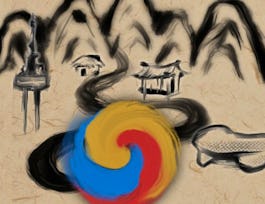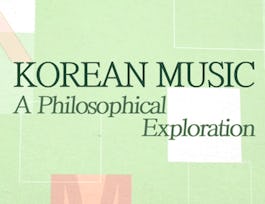This course will give you the cultural and historical background to begin your journey into Korean philosophy, and there is no prerequisite knowledge on philosophy required. Anybody who either has an interest in Korean culture, maybe through K-Dramas or K-pop, or an interest in philosophy from a cross-cultural perspective, are all welcome.


Introduction to Korean Philosophy and Culture
Taught in English
Some content may not be translated
16,005 already enrolled
(188 reviews)
What you'll learn
Compare Korean philosophy with both Chinese philosophy as well as Western philosophy
Explore the field of Korean philosophy and its development through its continued innovation
Discuss the key ideas in Korean philosophical debates, such as the concepts of moral emotions and everyday feelings
Reflect the Korean philosophical traits reflected in Korean language
Skills you'll gain
Details to know

Add to your LinkedIn profile
5 quizzes
See how employees at top companies are mastering in-demand skills


Earn a career certificate
Add this credential to your LinkedIn profile, resume, or CV
Share it on social media and in your performance review

There are 4 modules in this course
This week, we’re going to look at what Korean philosophy is, and what makes it different from the Western philosophy that you might be accustomed to. We’ll also be looking at Chinese philosophy in comparison to Korean philosophy, because it has had a large influence on the evolution of Korean philosophy.
What's included
9 videos2 readings1 quiz2 discussion prompts
This week, we will look at how Koreans formed their own culture and ideas. What we consider to be “Korean” today is the result of their long-standing self-awareness and tenacious practice of reconstructing the cultures from outside. Among them, the Chinese culture had the deepest influence on pre-modern Korea. We will explore ways Koreans have adapted and innovated at cultural boundaries.
What's included
9 videos1 reading1 quiz1 discussion prompt
This week, we will cover two traits that are often used to describe Koreans: One is “Koreans are affectionate” and the other is “Koreans are argumentative.” We will focus on these two seemingly contradictory characteristics of Koreans and revisit the two famous debates in the history of Korean philosophy: the Four-Seven Debate and the Horak Debate.
What's included
8 videos1 reading1 quiz2 discussion prompts
Koreans have developed their way of thinking by innovating on knowledge at cultural boundaries. What they developed are reflected in contemporary Korean language. This week, we are going to talk about the core ideas of Korean philosophy that have endured up till now. We’ll see how we can think differently about the world through these ideas.
What's included
8 videos1 reading2 quizzes1 peer review1 discussion prompt
Instructor

Offered by
Recommended if you're interested in Philosophy

Sungkyunkwan University

Yonsei University

Yonsei University

Sungkyunkwan University
Why people choose Coursera for their career




Learner reviews
Showing 3 of 188
188 reviews
- 5 stars
89.94%
- 4 stars
6.34%
- 3 stars
2.11%
- 2 stars
1.05%
- 1 star
0.52%

Open new doors with Coursera Plus
Unlimited access to 7,000+ world-class courses, hands-on projects, and job-ready certificate programs - all included in your subscription
Advance your career with an online degree
Earn a degree from world-class universities - 100% online
Join over 3,400 global companies that choose Coursera for Business
Upskill your employees to excel in the digital economy
Frequently asked questions
Access to lectures and assignments depends on your type of enrollment. If you take a course in audit mode, you will be able to see most course materials for free. To access graded assignments and to earn a Certificate, you will need to purchase the Certificate experience, during or after your audit. If you don't see the audit option:
The course may not offer an audit option. You can try a Free Trial instead, or apply for Financial Aid.
The course may offer 'Full Course, No Certificate' instead. This option lets you see all course materials, submit required assessments, and get a final grade. This also means that you will not be able to purchase a Certificate experience.
When you enroll in the course, you get access to all of the courses in the Specialization, and you earn a certificate when you complete the work. Your electronic Certificate will be added to your Accomplishments page - from there, you can print your Certificate or add it to your LinkedIn profile. If you only want to read and view the course content, you can audit the course for free.
If you subscribed, you get a 7-day free trial during which you can cancel at no penalty. After that, we don’t give refunds, but you can cancel your subscription at any time. See our full refund policy.


